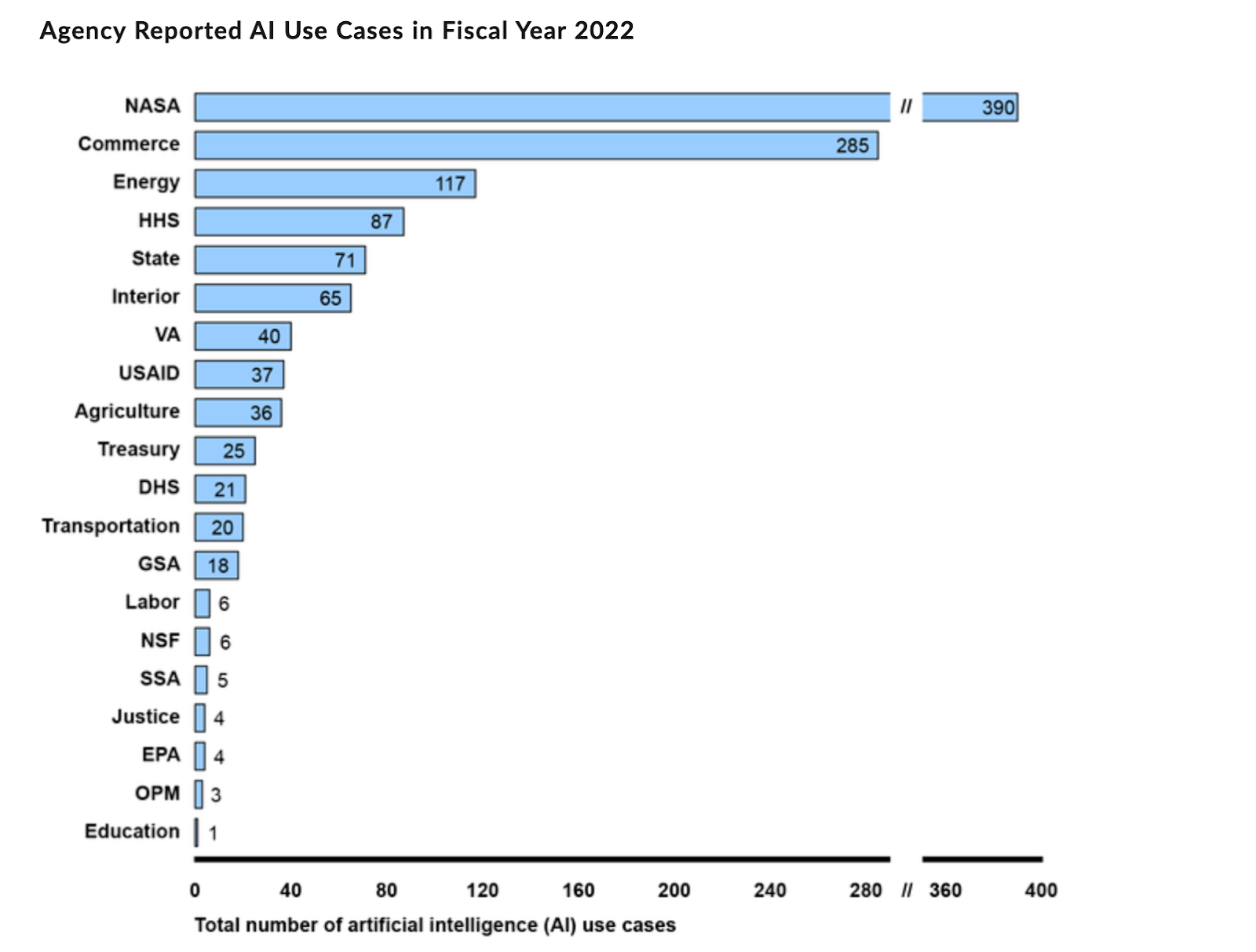US federal agencies and AI: The race is on
Audit finds that there are 1,200+ government AI use cases in development and in use today

The AI revolution in federal agencies has begun
Federal agencies are ramping up their use of artificial intelligence significantly, according to a US Government Accountability Office (GAO) audit. The report noted that there were 228 different AI use cases in operation, with over 500 more in planning and approximately another 500 in research or exploration phases. These numbers are likely conservative, considering the rapid advancement in AI since the report compiled its data for Fiscal Year 2022.
Agencies are employing AI for diverse purposes to enhance their agency’s mission — from analyzing surveillance data for border activities to interpreting drone images to detecting cybersecurity threats and processing large data sets. Notably, NASA and the Department of Commerce are leading in AI integration, with applications ranging from global volcano monitoring to wildlife tracking.
AI's potential and policy challenges
This swift adoption underscores AI's transformative potential in government functions. However, it also brings to light the many challenges in policy and regulation. As governments around the world are grappling with how to regulate and ensure that AI is implemented responsibly, innovation isn’t slowing down to wait. The absence of a government-wide standard for AI procurement raises a number of concerns ranging from national security threats to algorithmic biases. Elastic® looks forward to continuing our work with policymakers to help ensure responsible AI use.
Diverse AI use cases in government
From analyzing surveillance data for border activity detection to assisting in scientific explorations, the scope of AI applications in the government is broad, diverse, and exciting. These case studies reflect both the potential and complexity of AI in enhancing the government’s ability to fulfill its specific mission and to better serve US citizens.
The need for responsible AI integration
The Biden Administration has made some great strides over the past six months to develop some high-level guidelines. While Biden's Executive Order on AI is a significant step forward in clarifying these guidelines, the GAO report emphasizes the importance of policy development to ensure responsible AI use, highlighting the need for policies that safeguard privacy and security while leveraging AI's benefits.
Keeping the focus on ethical and secure AI
As AI reshapes government operations and improves citizen experience, it's crucial to maintain a focus on ethical and secure AI use. This GAO report is likely the first of many and serves as a reminder of the significance of aligning policy with technological advancements, ensuring AI's benefits are fully realized and its risks are managed. It’s clear that the US government is planning on using AI to further its mission, and AI’s impact is just getting started.
Top considerations for government agencies implementing AI
Accuracy: 36% of government leaders have concerns about inaccurate generative AI outputs — or hallucinations. To address these concerns, many organizations are using retrieval augmented generation (RAG) to add critical context to generative AI applications. RAG grounds large language models (LLMs) with an agency’s own internal data, improving the quality and accuracy of the outputs.
Privacy-first AI: Government agencies are responsible for safeguarding sensitive data, and that data shouldn’t be used to train public LLMs. RAG is able to securely supply relevant internal context you need, without exposing that data to the public domain. Technology like Elasticsearch® can also apply role-based access security controls to ensure that only the appropriate people have access to specific data sets.
- Compliance: As agencies await AI legislation around ethical usage, it will be essential to maintain full visibility into all your data, of all types. You’ll want to know which data is used for each AI use case and how to holistically access and get insights from that data when needed.
Learn more about AI for government agencies
The release and timing of any features or functionality described in this post remain at Elastic's sole discretion. Any features or functionality not currently available may not be delivered on time or at all.
In this blog post, we may have used or referred to third party generative AI tools, which are owned and operated by their respective owners. Elastic does not have any control over the third party tools and we have no responsibility or liability for their content, operation or use, nor for any loss or damage that may arise from your use of such tools. Please exercise caution when using AI tools with personal, sensitive or confidential information. Any data you submit may be used for AI training or other purposes. There is no guarantee that information you provide will be kept secure or confidential. You should familiarize yourself with the privacy practices and terms of use of any generative AI tools prior to use.
Elastic, Elasticsearch, ESRE, Elasticsearch Relevance Engine and associated marks are trademarks, logos or registered trademarks of Elasticsearch N.V. in the United States and other countries. All other company and product names are trademarks, logos or registered trademarks of their respective owners.
